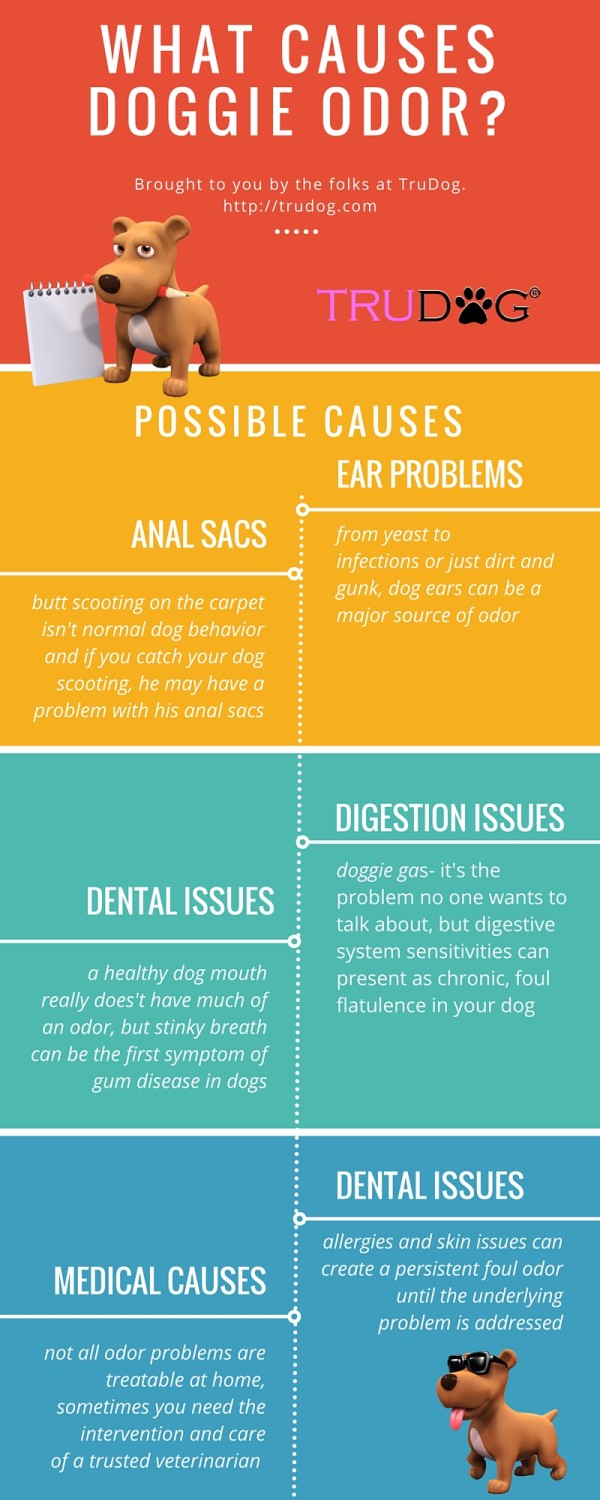All dogs are capable of getting a little smelly every once in awhile. Sometimes they go too long between dips in the tub or they get into something stinky outside, like another animal’s poo or a tangle with a skunk. Your dog thinks he smells wonderful all the time–you? Not so much.
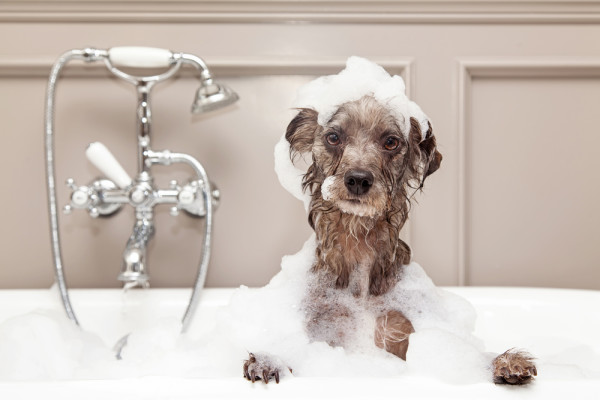
If your dog has a persistent odor that isn’t caused by something obvious and that a soak in the tub doesn’t take care of, your dog may need a little pet parent help to smell clean and fresh again. There are plenty of things that can cause your dog to have a constant foul odor. Some of them are relatively benign and easy to take care of without medical intervention. Others can be signs of serious health problems that will need a vet’s attention.
Let’s look at some of the more common reasons for persistent odor in dogs:
Skin Issues and Dog Odor
Canine Seborrhea* is a common cause of odor in dogs. In addition to a distinct odor, it causes dandruff and greasy hair and skin. You’ll notice the odor is more pronounced around the ankles, elbows, armpits, underbelly and ears — places where the oil builds up. You may also notice your dog scratching those areas, which can lead to additional problems.
This condition isn’t generally caused by poor pet parenting. It’s largely genetic. However, like most pet health issues, an appropriate, meat-based diet like FEED ME with regular doggie supplements to correct any system imbalances like SOOTHE ME for skin and coat health, can play a role in helping control the condition. Plus, it’s vital to make sure your dog gets plenty of water.
Anal Sac Infection and Doggie Odors
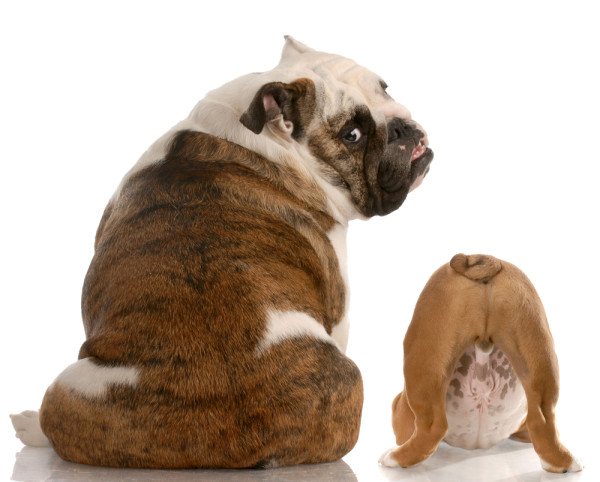
We’ve all seen the symptoms of this one before, even if we didn’t recognize it. A common symptom of this problem is when Fido does the butt scoot all the way across the living room carpet. Dogs do this to try to soothe irritation to a pair of small pouches on the lower half of their anus. The sacs create an oily brown fluid.
When the sacs are healthy, you don’t notice the smell (unless you get up really close and sniff, I suppose, but other dogs will). In fact, that’s why dogs sniff bottoms when they meet.
When a dog has an anal sac infection*, though, it creates a very noticeable odor.
Unfortunately, it can also cause more serious problems for your dog. The best prevention for anal sac infection is lots and lots of exercise and a healthy diet.
Obesity increases the likelihood that your dog will suffer from this condition. If your dog is already doing the scoots, you’ll need to have the anal sacs drained. Your vet can show you how to do this yourself if you have the stomach for it, but it’s a good idea to let the vet handle it the first time, so she can check for any related problems.
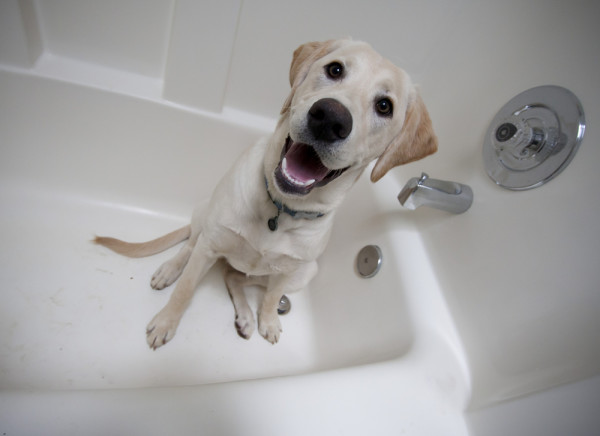
Allergies/Yeast Overgrowth and Smelly Dogs
Often, allergic reactions cause dogs to smell bad. Much like human allergic reactions, canine allergy problems can be caused by a number of irritants. Pollen, dust, yeast overgrowth and fleas are just a few of the common causes of allergic reactions in dogs.
Food allergies – often caused by the grain-based diet promoted by the major pet food companies – are often the underlying cause.
The treatment for dog allergies varies depending on what’s causing the allergic reaction. Often, anti-fungal shampoos can take care of the problem. Oatmeal baths may also help. Other times, vets may prescribe medication, though there are also often homeopathic options that are safer for your dog.
Other times, the solution is as simple as providing your dog the kind of diet that nature intended for her to have – a diet made up of raw meat like FEED ME BEEF, or FEED ME TURKEY if your dog has food allergies and needs a nutritious hypoallergenic dog food.
To help prevent allergic reactions, support your dog’s immune system and try giving her a probiotic for dogs to help balance her digestive system and prevent yeast overgrowth. Products that can help are: PROTECT ME prebiotic and probiotic in gravy form, and COMPLETE ME dog supplements to boost immune system health and reduce inflammation. Dog-O-Suds doggie shampoos with essential oils are great for dogs battling skin and allergy issues as well. Just be sure not to bathe your dog too often, and this can aggravate skin issues and lead to even more odor issues.
He’s All Ears
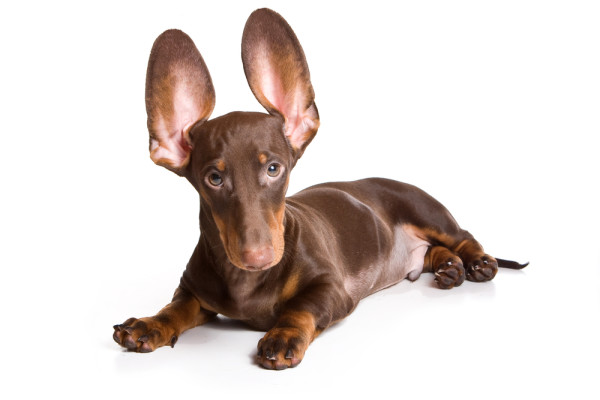
Outer ear infections* (otitis externa) are a common cause of persistent odor in dogs. Some breeds of dogs are more prone to ear infections than others (generally, the ones with larger, floppy ears), but any dog can have one.
Ear infections can be caused by external factors or any combination of skin allergies, immune system problems and hormonal imbalances. Usually, it boils down to a bacteria or yeast problem. Either way, vets normally treat ear infections by flushing the ears (they can show you how to do this yourself at home) and with medication.
As you can imagine, most dogs aren’t crazy about the whole ear flushing process, but a healthy treat like one of the real meat varieties of TREAT ME treats for dogs after the flushing can go a long way towards helping him tolerate it better.
Supporting his immune system and regularly cleaning your dogs can help prevent problems before they occur. Try COMPLETE ME dog supplements with omega oils to boost your dog’s immune system and CLEAR ME pet ear cleaner for regular ear grooming in between veterinarian exams.
Good, Old-Fashioned Gas
Nobody likes to sit next to a dog – or person, for that matter – who’s constantly passing gas. Unfortunately for Fido, he probably won’t get why it’s a problem to pass gas anywhere, anytime. The good news is that flatulence* generally isn’t a sign of a health issue in and of itself. However, it can be a symptom of respiratory problems, irritable bowel syndrome, digestion problems, or inflammatory bowel disease, so it doesn’t hurt to have him checked if he’s constantly clearing the room with his gas.
A common cause of canine flatulence is a diet that contains foods high in fiber or:
- Spices
- Soybeans
- Milk or milk products
- Beans
- Peas
In other words, flatulence can be caused by many kinds of commercial dog food, including some of the pricier ones.
Here’s the thing: dogs just are not designed (or evolved) to properly digest plant-based food sources. Your dog doesn’t really need any vegetables in her diet if she’s eating a Species Appropriate diet – and if your dog has flatulence, the kibble you’re feeding her should be suspect number one.
The good news is that correcting your dog’s diet can also help prevent a number of much more serious health conditions while cutting down on doggy farts.
Proper Dental Care
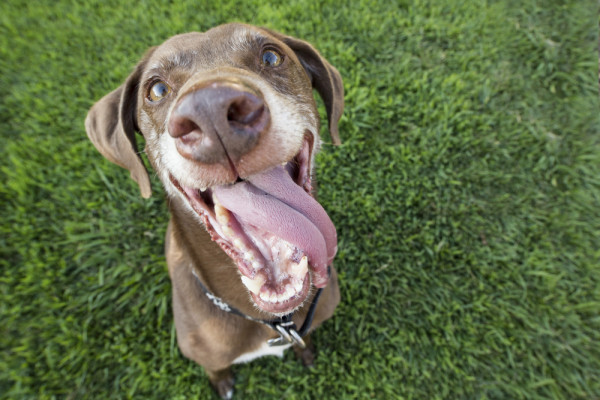
Finally, one of the main reasons dogs get stinky (much like their human friends) is that they aren’t getting the proper dental care. Your dog’s choppers are among the most important (and, sadly, often the most neglected) parts of her body and serious bad breath can be a sign of something very wrong inside your dog’s mouth.
We’re not talking about normal ‘dog breath,’ but if your dog’s breath has an unusual odor to it, you’ll want to get her checked out by a vet. Bad breath in dogs can indicate a number of health problems, including:
- Kidney disease – breath smells like urine
- Liver problems – breath is particularly foul, especially if your dog is also vomiting, loses her appetite or has a yellow tint to her gums or corneas (the transparent layer of her eyes)
- Diabetes – breath has a fruity, sweet smell, especially if your dog is drinking and peeing more than normal
- Gum disease- foul odor that can sometimes announce your dog’s whereabouts from across the room, similar to the odor humans get when they have gingivitis or a cavity
Treatment for bad breath in dogs can vary from changing the dental care you’re giving her to having her teeth cleaned by a pro, or to simply changing her diet – something you should consider doing anyway if your furry friend isn’t already eating a nutritious raw meat diet like the convenient freeze dried FEED ME.
Other things you can do to help include brushing your dog’s teeth – or increasing the frequency of brushings – using a pet dental spray in between dental visits, and giving your dog hard chew toys.
If your dog’s smelly problem persists despite your best detective work and treating him at home, you’ll want to consult with your veterinarian for a full checkup to help determine if a medical condition is to blame for your dog’s perpetual smelliness. Sometimes, a change in odor can be one of the first signs of a medical problem.
This Post Was Sponsored By The Good Folks At TruDog:
Resources:
